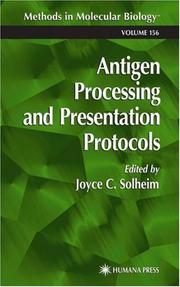| Listing 1 - 1 of 1 |
Sort by
|

ISBN: 0896037452 9786610820535 1280820535 1592590624 Year: 2001 Publisher: Totowa (N.J.) Humana Press
Abstract | Keywords | Export | Availability | Bookmark
 Loading...
Loading...Choose an application
- Reference Manager
- EndNote
- RefWorks (Direct export to RefWorks)
The processing and presentation of antigens by major histocompatibility complex (MHC) molecules is a crucial immunological phenomenon in infectious disease, malignancy, autoimmune disease, and transplantation. In Antigen Processing and Presentation Protocols, well-recognized and innovative experimentalists detail their cutting-edge methods for studying this complex process. Drawing on expertise from biochemistry, cell biology, and immunology, they describe step-by-step methods designed to question how MHC-binding peptides are generated, to test how peptides are delivered to MHC molecules, to analyze MHC peptide-binding patterns, and to assay the T cell response to the MHC/peptide complex. Each method is presented in sufficient detail to be readily reproducible and includes notes about potential pitfalls and tips on how to avoid failures. Emphasis is given those technical steps critical for experimental success that are often omitted from methods published in the primary literature. Eminently accessible and state-of-the-art, Antigen Processing and Presentation Protocols provides both new and experienced investigators with highly practical tools that will extend the questions that can be asked, and effectively be answered, concerning antigen processing/presentation.
Molecular biology --- Antigen presenting cells --- Antigens --- HLA histocompatibility antigens --- Major histocompatibility complex --- Molecular immunology --- HL-A histocompatibility antigens --- HLA antigens --- HLA transplantation antigens --- Human leukocyte antigens --- Transplantation antigens, Human --- Histocompatibility antigens --- Immunity --- Immunoglobulins --- Immune system --- Immunology --- Accessory cells --- Immunologic accessory cells --- Immunocompetent cells --- Histocompatibility complex --- MHC (Immunogenetics) --- Immunogenetics --- Molecular aspects --- Immunology. --- Immunobiology --- Life sciences --- Serology
| Listing 1 - 1 of 1 |
Sort by
|

 Search
Search Feedback
Feedback About UniCat
About UniCat  Help
Help News
News